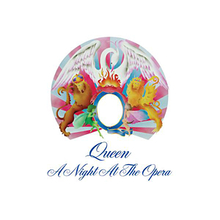A Night At The Opera (album)
| A Night at the Opera | ||||
|---|---|---|---|---|
 |
||||
| Studio album by Queen | ||||
| Released | 21 November 1975 | |||
| Recorded | August – November 1975 | |||
| Studio | Sarm, Roundhouse Studios, Trident Studios, Olympic Studios, Scorpio and Lansdowne, London and Rockfield, Monmouthshire | |||
| Genre | ||||
| Length | 43:10 | |||
| Label | ||||
| Producer |
|
|||
| Queen chronology | ||||
|
||||
| Singles from A Night at the Opera | ||||
|
||||
| Professional ratings | |
|---|---|
| Review scores | |
| Source | Rating |
| AllMusic | |
| Chicago Tribune | |
| Encyclopedia of Popular Music | |
| Pitchfork Media | 8.9/10 |
| PopMatters | 9/10 |
| Q (1993) | |
| Q (2006) | |
| The Rolling Stone Album Guide | |
| Uncut | |
| The Village Voice | B– |
A Night at the Opera is the fourth studio album by the British rock band Queen, released on 21 November 1975 by EMI Records in the United Kingdom and by Elektra Records in the United States. Produced by Roy Thomas Baker and Queen, it was the most expensive album ever recorded at the time of its release. The album takes its name from the Marx Brothers film of the same name, which the band watched one night at the studio complex when recording.A Night at the Opera incorporates a wide range of styles, including ballads, songs in a music hall style, hard rock tracks and progressive rock influences.
The album topped the UK Albums Chart for four non-consecutive weeks. It peaked at number four on the US Billboard 200 chart and became the band's first Platinum-selling album in the US. The worldwide sales for the album are over six million copies. It also produced the band's most successful single in the UK, "Bohemian Rhapsody", which became their first UK number one and one of the best-selling singles in both the UK and the world.
"Death on Two Legs" can be referred to as Freddie Mercury's hate letter to Queen's first manager, Norman Sheffield, who for some years was reputed to have mistreated the band and abused his role as their manager from 1972 to 1975. Sheffield denied that in his autobiography entitled "Life on Two Legs: Set The Record Straight", published in 2013, and referred to copies of the original 1972 management contracts between Sheffield and Queen, which were included in the book as proof of his defence. Though the song never makes direct reference to him, after listening to a playback of the song at Trident Studios during the time of album release, Sheffield was appalled, and sued the band and the record label for defamation, which resulted in an out-of-court settlement, but also confirmed his connection to the song.
...
Wikipedia
